Joe Rogan, Spotify and Stand-Up Comedy's 'Cancel Culture' Reckoning
Wayne Federman, author of a history of the art form, surveys a battlefield strewn with Chappelle, arrests and even 'Friends'
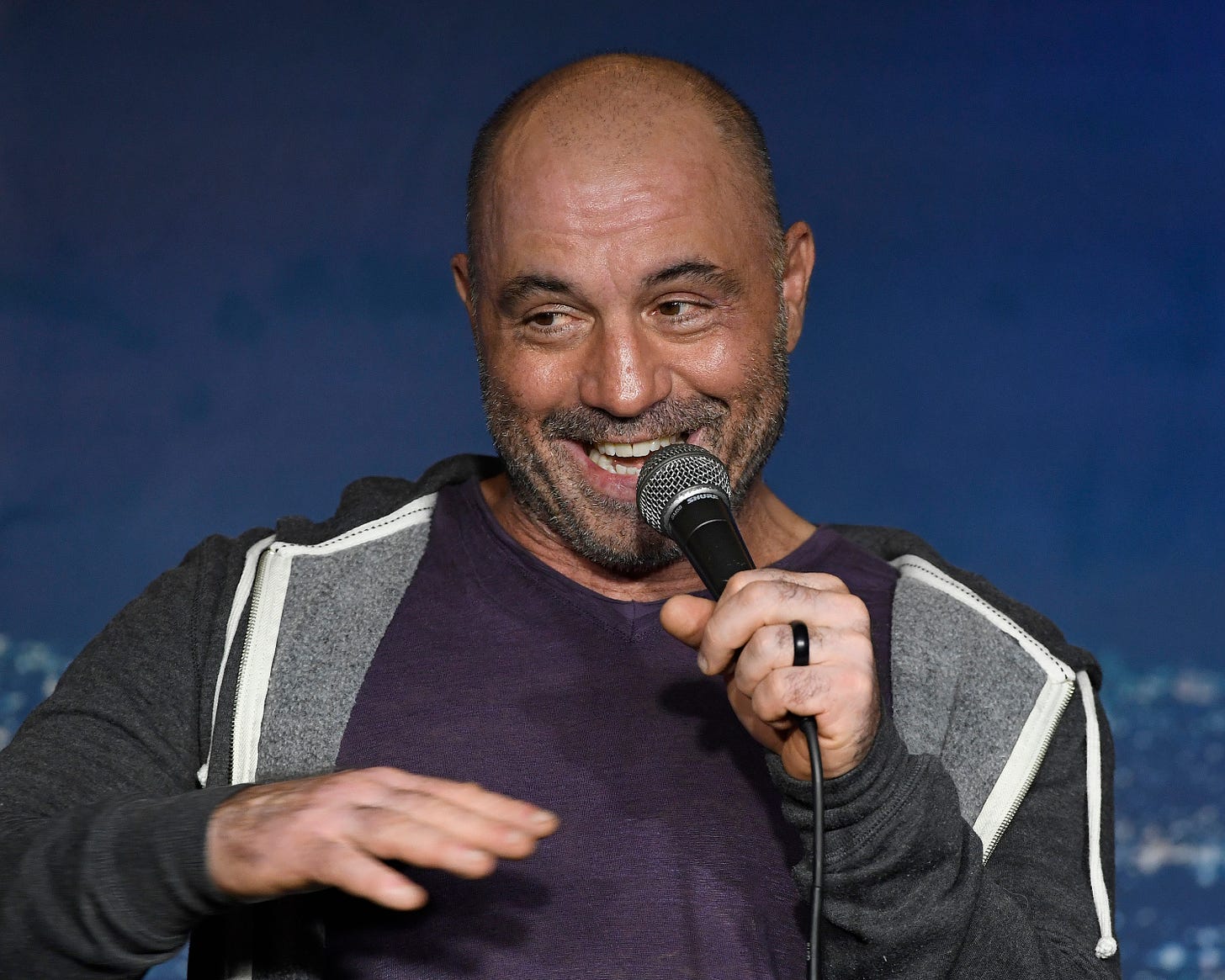
By Wayne Federman
A comedian, USC professor, and author of The History of Stand-Up, Federman surveys a battlefield strewn with Chappelle, episodes of Friends and Seinfeld, and “competing values.”
Q: To start with the news of the moment, what do you think about all the fighting over Joe Rogan?
There are multiple elements to this controversy. At its core, Joe is caught between those who value open and free discourse versus those who think some ideas and language are simply unacceptable online. So, there is pressure for Spotify to uphold a minimum community standard and remove Rogan from their platform.
Q. He used the N-word.
Indeed. Multiple times. Certainly, that word is the third rail for a large segment of the population. Grounds for immediate dismissal. Rogan even sticks the landing with the hard “r.”
Q. Wait, you’re not answering what Spotify should do.
They’re a private company who must make both a business and ethical decision. Again, this is a battle of competing values. Free expression vs. acceptable discourse. But there’s much more. There’s a liberal/conservative dimension to this story. Plus, when do dissenting opinions morph into misinformation? Do comedians have a responsibility to be journalistically accurate? Is there any context that allows for offensive language? Who even decides what is acceptable? Lots to tease out in this moment.
Q. So how does this all shake out?
We are right in the middle of this wave so who knows? Some people think that cancel culture is more accurately described as “consequence” culture or “call out” culture. Obviously, the perceived power of social media has supercharged this issue. Ultimately, I believe the market will sort this all out. The public gets to decide. Ask me again in a year and I might have a different answer.
Q. Okay, let’s move on to Bill Cosby…
From the frying pan…
Q. I see you’re in the new Cosby documentary, is it really necessary to talk about him?
Good question. W. Kamau Bell (the director) decided it was the right time to examine his legacy. And apparently, the execs over at Showtime agreed with him. I know a lot of people wish that we would stop bringing up his name. That talking about him - and specifically his show business accomplishments - is just gross and insensitive. I totally get that. But Kumau’s a fellow stand-up and a thoughtful observer of our culture. He is the one taking all the risk and I wanted to support him. I only add some historic context to Cosby’s stand-up career. It’s a minefield.
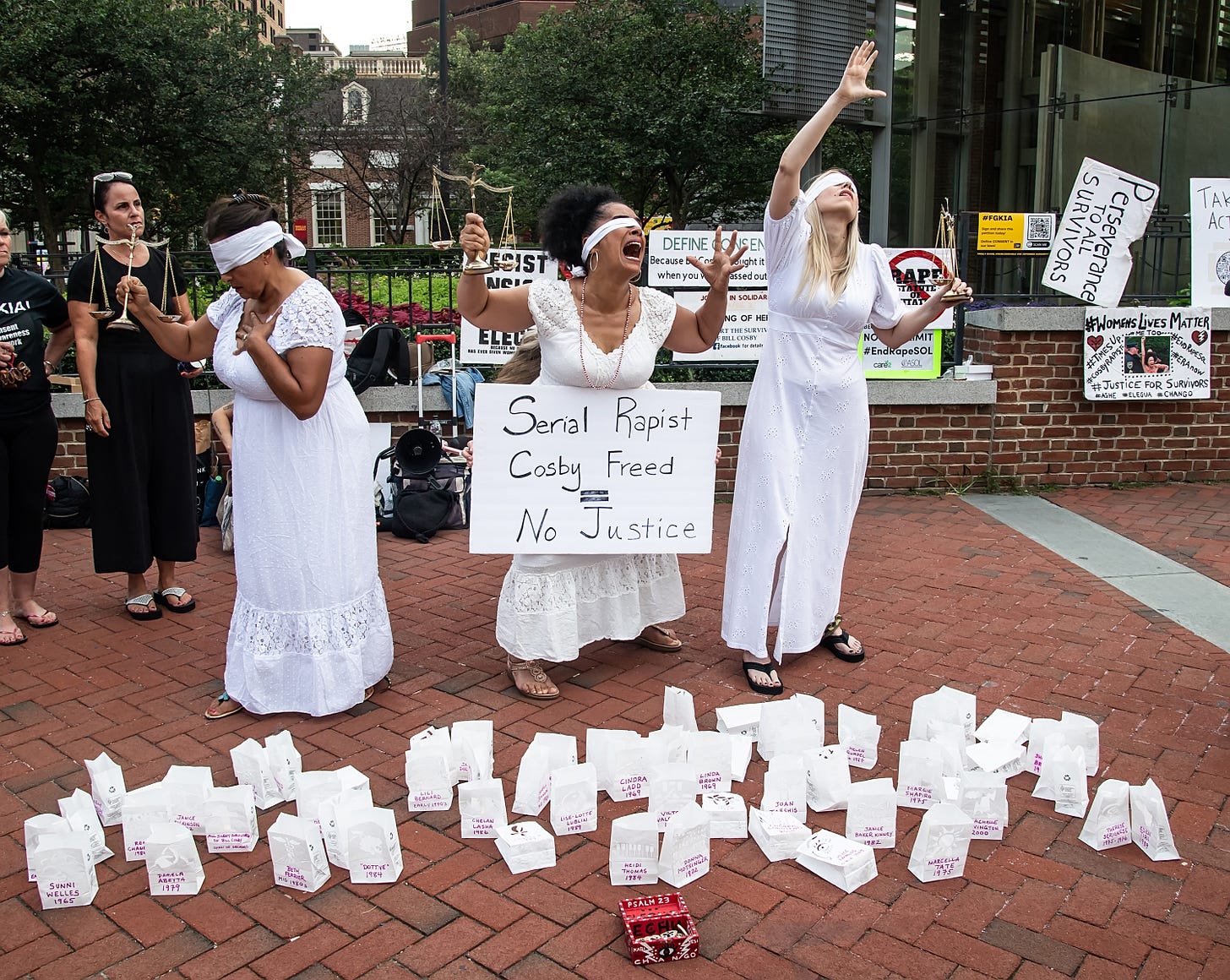
Q. You’re also currently co-producing a new HBO documentary on George Carlin?
Yes, and I’m thrilled to be part of it. The old Zen Diaries of Garry Shandling team is back together. Judd Apatow is co-directing with Mike Bonfiglio. Carlin is one of the few comedians whose material has social relevance outside his time. Most stand-up comedy is generational, which is why bits and references tend to expire — like milk. Carlin is an exception. His old routines get widely shared on social media. It’s wild. His reach is international. He even has his own Sirius radio channel.
Q. How would Carlin handle today’s so-called “cancel culture”?
I don’t think he ever used that term, and I would never want to speak for him. But it’s safe to say that Carlin was a thoughtful, First Amendment purist who bristled at any group that tried to control language. He was fascinated by the intricacies of the English language, which is amazing considering he was a 9th-grade dropout. Carlin left us some brilliant, provocative routines on religion, abortion, environmentalists, war, and the “American dream.” But he also had bits about “how rape can be funny,” or why voting is meaningless, or that it’s okay to use the n-word. I can’t imagine anyone trying out those premises in today’s climate.
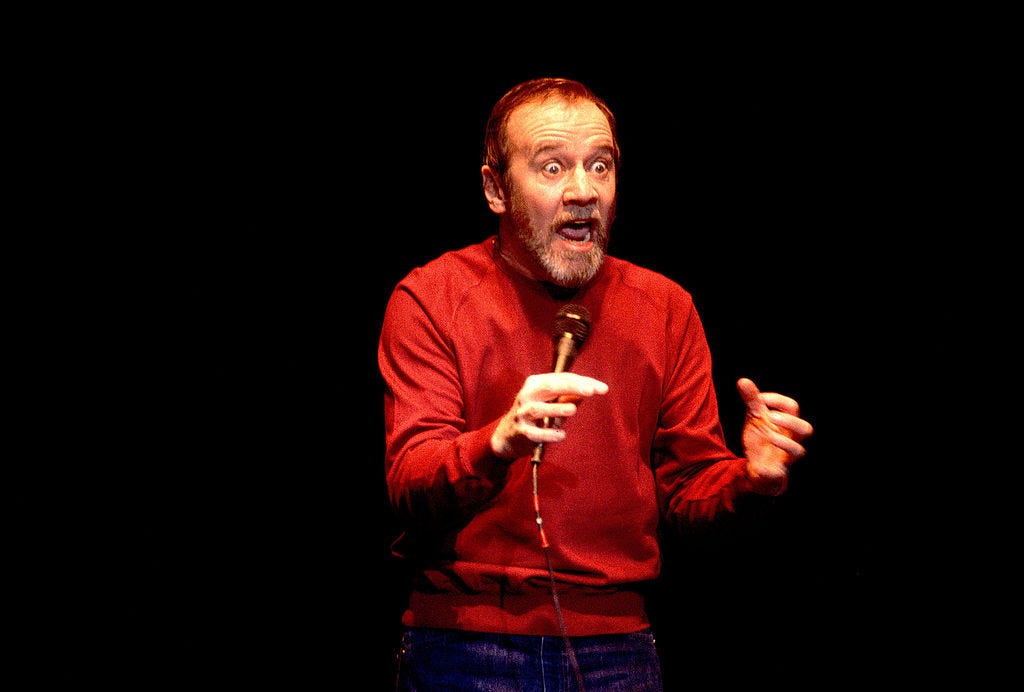
Q. So those premises are now over the line?
The truth is that the “line” is always changing. And will continue to change. Societal and language norms evolve. Let me repeat that, societal and language norms evolve. That’s why, as bizarre as it may seem, some of the jokes on mainstream sitcoms like Friends or Seinfeld are considered problematic to a certain population. And they get called out.
Q. And this is a new development?
Actually no. Like I mentioned earlier, audiences have been protesting comedians and comedy for well over 120 years.
Q. Wait, stand-up comedy goes back to the 1800s?
Yep. It wasn’t called “stand-up” back then. But yeah, there were performers, they were called monologists, who got paid to stand on stage, alone, and get laughs. Yep, this all predates the brick wall, microphone, and the two-drink minimum.
Q. So, what restrictions did those early comics have to navigate?
Oh my. So much tougher than anything today. It’s not even comparable. In vaudeville, comics couldn’t swear at all — no “damns” “hells” or even “slobs.” Nothing close to the casual profanity used by today’s acts. But people took offense for other aspects of their performances. At the turn of the 20th century a lot of comedy was based on ethnic melting pot stereotypes: Irish, Jewish, German, Black, Greek, Scottish, etc. Eventually, due to organized pressure groups, most of these acts were forced to drop the stereotyping and do just straight stand-up. That’s why there’s no more professional blackface performers or minstrel shows. I think we can all agree that was a positive development.
Plus, comedians, you know, used to get arrested.
Q. Like Lenny Bruce?
He’s only the most notorious one. Mae West spent eight days in jail in 1927 for indecency. Other performers got arrested for language or even for performing in drag. Lenny famously got pinched for his “speech crimes” in San Francisco, Los Angeles, Chicago, and New York.
Q. Just for using bad language onstage in a nightclub?
The police used local obscenity laws as the pretense. They wanted to shut him up. Especially his bits on religion. Don’t forget John Kennedy, our first Catholic U.S. president, was in office when Lenny started getting arrested for his speech. I’m sure the local authorities didn’t appreciate some Jew comic railing against the Church. Both Richard Pryor and George Carlin got arrested in the 1970s for violating local obscenity laws. So, comedians have been navigating these waters for a while.
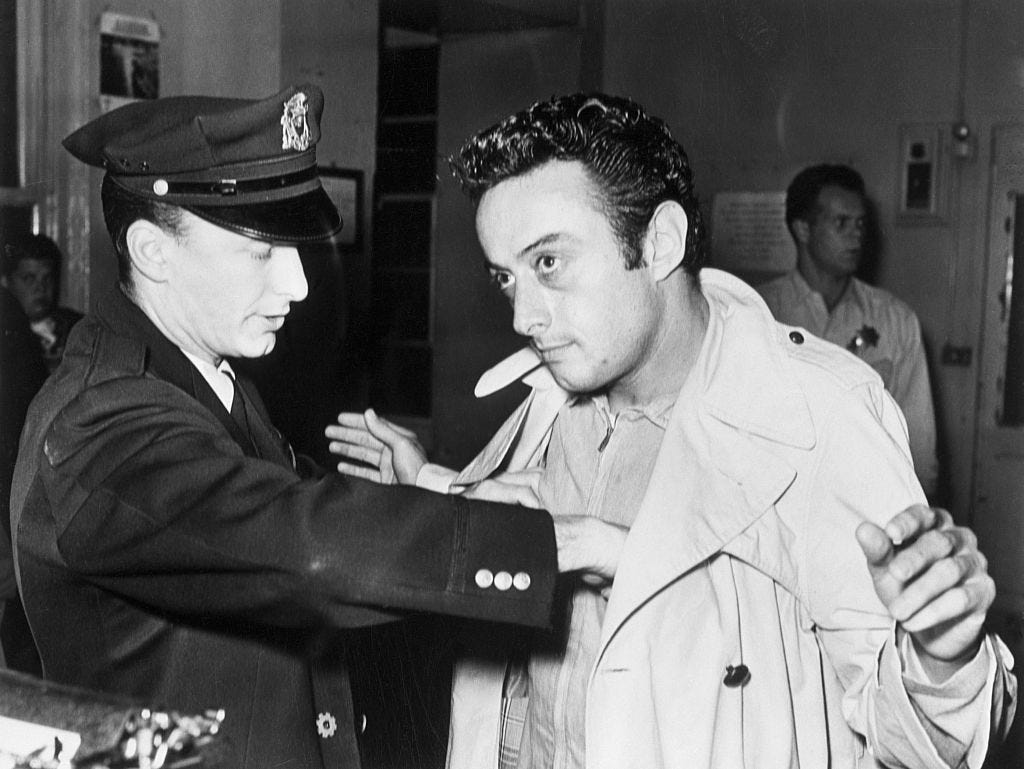
Q. But no one is getting arrested these days?
Thank God. Now, you’re just publicly shamed and, in some cases, forced off private media platforms.
Q. Does this outside pressure have a chilling effect on free speech?
Probably. I do think there’s a bit of self-censorship going on today. But, for the vast majority of comics — it’s really not a problem. At all. They get how language has evolved and are thrilled to deliver material within today’s parameters. It’s as simple as being kind and respectful. But George Carlin did say, “I think it's the duty of the comedian to find out where the line is drawn — and cross it deliberately.” So, there’s that.
Q. Isn’t it a positive development that comics consider the real-world effect of their words?
This goes back to what I said earlier about values. A great example is what’s happening with Dave Chappelle. To some, it’s wonderful that Dave has the freedom to express what he thinks is funny. He’s obviously highly skilled at stand-up comedy — he’s the current holder of the Mark Twain Prize. Chappelle is exactly what some fans want out of their comedians, free expression even if that means they are sometimes offended. But to others, his freedom needs to be tempered with more sensitivity. They believe Chappelle is a bully of sorts and is using his platform to make life harder for some trans folks and therefore must be stopped. Again, this ongoing battle between competing values. There are many sub-threads in this discussion as well, including the debate over intent vs. impact.
Q. So, in this current climate, can stand-up survive?
Putting aside the possibility of a future deadly variant that makes public gatherings impossible, then yes, of course, stand-up comedy can survive. Come on. That’s silly. It’s flourishing right now. Even with the pandemic.
Q. Why did you write a book on stand-up comedy history?
Because no one had done it before. There were books on comedy history, profiles of comedians, treatises on joke theory, and books on specific eras of stand-up (two of my favorite are The Last Laugh and Seriously Funny). I just simply lay out the story from 1858 until today.
Q. What advice do you give your USC students who want to try stand-up?
Be funny. That’s the job description. Do material that they can stand behind. And don’t be a dick. Ultimately the crowds will tell you whether your premises work. Stand-up is a collaborative art form. You need the feedback. Dana Gould summed it up beautifully, “stand-up comedy is a conversation. But only one person is talking.”
Also on The Ankler:
Podcast: Tom Cruise and how the Mission: Impossible franchise was saved over one very awkward dinner. Christine Peters was Sumner Redstone's girlfriend, Jon Peters' wife and helped oust Les Moonves with her #MeToo story. Now, she's talking — about everyone from Tom Cruise to Shari Redstone
ESG: Whoa! Oscar Movies' Sudden Plot Twist. The numbers have been crunched and it's not what you think.
Hollywood Transom on the latest turn in the long-running drama around the actress and the studio titans whose careers came to an end over their associations with her. Now, there’s a $3o0m lawsuit against Ron Meyer and NBCU by Charlotte Kirk’s ex.
Oscar nom reacts from Ankler Rushfield and producer Michael Shamberg.
Michael Wolff on Jeff Zucker and the Insatiable 'Will to Power'
Neal Gabler: The Academy Museum, Whoopi, and the Tortured Identity of Hollywood Jews. The author of 'An Empire of Their Own' also talks Zuckerberg, Trump and how entertainment wants to "put some distance between itself and its Jewish founders."
Zuckenfreude! The kneecapping of Jeff Zucker is the perfect crime — three cities full of possible suspects. The downfall of a Hollywood fixture and all its rich implications.
WE NOW HAVE GROUP SUBSCRIPTIONS! Please email Kymber Allen at kymber@anklermedia.com for more information,
IF YOU ARE INTERESTED IN ADVERTISING on The Ankler, The Ankler Hot Seat, or The Optionist, please contact Kymber as well.
The Ankler is an independent voice covering Hollywood. If you’re a subscriber, feel free to share this edition with a friend but just a couple, please. The Ankler depends on its paid subscribers.
And if you’ve been passed along this issue, please join us! And find out why the New York Times called us the “hit Hollywood newsletter.”



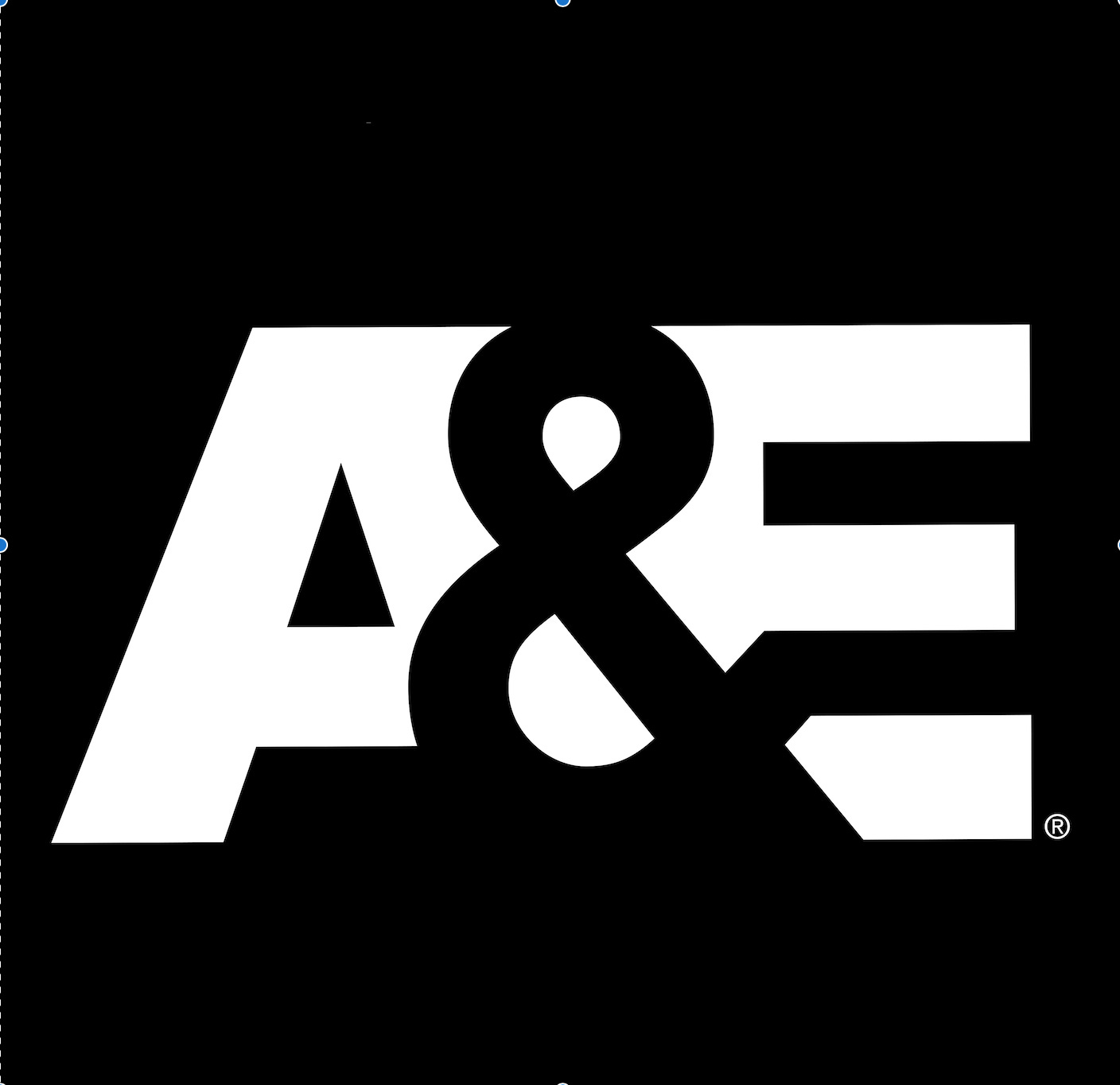


Spotify dumping Rogan would be what David Sacks calls a "bubble move." It serves the hysterical Blue Checks on Twitter, and the mainstream press that feeds off of them, but alienates everyone else. Jen Psaki and the Biden Administration, key politicians and the Blue Checks should really keep pressuring Spotify to lose Rogan. I mean, what could possibly go wrong? It isn't like the Democrats are LOSING voters in key demographics. I think they can, you know, afford to lose, say, 11 million working class center left voters. Reminds me of that line in Spinal Tap, "the Boston's gig's been canceled. But I wouldn't worry. It's not a big college town."
“Joe is caught between those who value open and free discourse versus those who think some ideas and language are simply unacceptable online” … I am sorry but that is BS … yes there is open discourse, but what Joe did is like debating if 2+2=4 and saying that no, it’s 5.4 … open discourse needs to recognize facts … especially when the result can mean people die. Spotify paid millions for content which means they are no longer a platform but a publisher. And with that come responsibilities. If they want to keep publishing this type of content then they represent it (they paid for it). Now I am more than happy for them to keep doing it, but don’t complain if people leave your service. I don’t care if Spotify stops partnering with Rogan, but i care if they want to have it both ways, pay and publish Rogan and be perceived as a non Rogan platform.